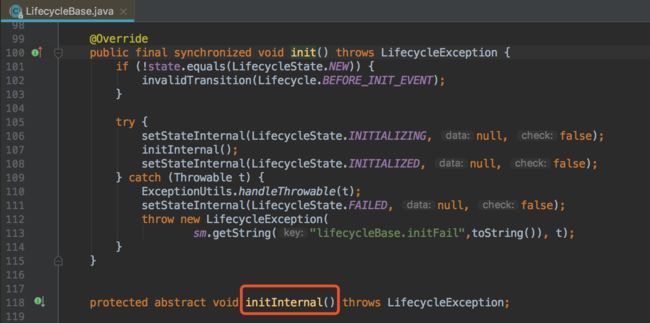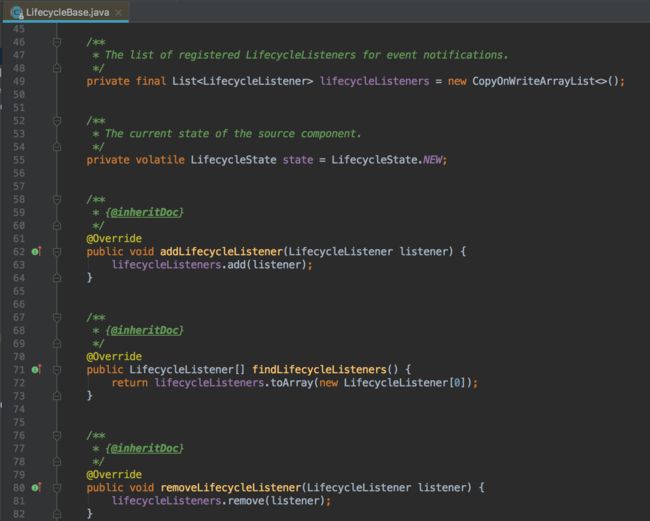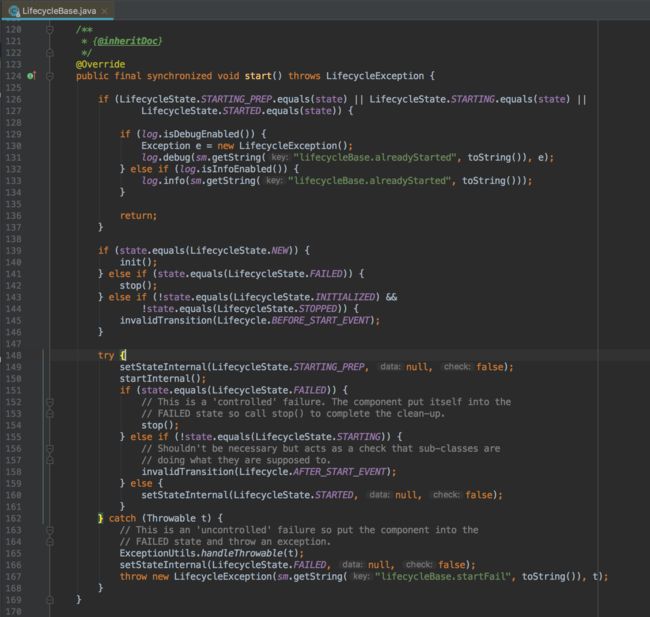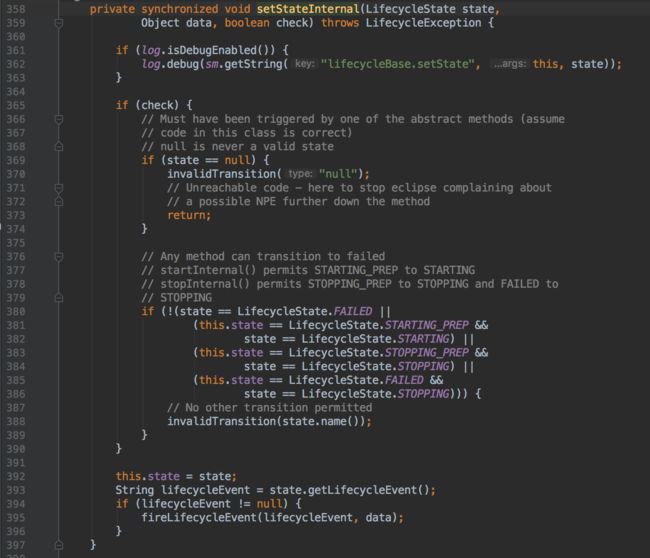/**
* Common interface for component life cycle methods. Catalina components
* may implement this interface (as well as the appropriate interface(s) for
* the functionality they support) in order to provide a consistent mechanism
* to start and stop the component.
*
* The valid state transitions for components that support {@link Lifecycle}
* are:
*
* start()
* -----------------------------
* | |
* | init() |
* NEW -»-- INITIALIZING |
* | | | | ------------------«-----------------------
* | | |auto | | |
* | | \|/ start() \|/ \|/ auto auto stop() |
* | | INITIALIZED --»-- STARTING_PREP --»- STARTING --»- STARTED --»--- |
* | | | | |
* | |destroy()| | |
* | --»-----«-- ------------------------«-------------------------------- ^
* | | | |
* | | \|/ auto auto start() |
* | | STOPPING_PREP ----»---- STOPPING ------»----- STOPPED -----»-----
* | \|/ ^ | ^
* | | stop() | | |
* | | -------------------------- | |
* | | | | |
* | | | destroy() destroy() | |
* | | FAILED ----»------ DESTROYING ---«----------------- |
* | | ^ | |
* | | destroy() | |auto |
* | --------»----------------- \|/ |
* | DESTROYED |
* | |
* | stop() |
* ----»-----------------------------»------------------------------
*
* Any state can transition to FAILED.
*
* Calling start() while a component is in states STARTING_PREP, STARTING or
* STARTED has no effect.
*
* Calling start() while a component is in state NEW will cause init() to be
* called immediately after the start() method is entered.
*
* Calling stop() while a component is in states STOPPING_PREP, STOPPING or
* STOPPED has no effect.
*
* Calling stop() while a component is in state NEW transitions the component
* to STOPPED. This is typically encountered when a component fails to start and
* does not start all its sub-components. When the component is stopped, it will
* try to stop all sub-components - even those it didn't start.
*
* Attempting any other transition will throw {@link LifecycleException}.
*
*
* The {@link LifecycleEvent}s fired during state changes are defined in the
* methods that trigger the changed. No {@link LifecycleEvent}s are fired if the
* attempted transition is not valid.
*
* @author Craig R. McClanahan
*/
public interface Lifecycle {
// ----------------------------------------------------- Manifest Constants
/**
* The LifecycleEvent type for the "component before init" event.
*/
public static final String BEFORE_INIT_EVENT = "before_init";
/**
* The LifecycleEvent type for the "component after init" event.
*/
public static final String AFTER_INIT_EVENT = "after_init";
/**
* The LifecycleEvent type for the "component start" event.
*/
public static final String START_EVENT = "start";
/**
* The LifecycleEvent type for the "component before start" event.
*/
public static final String BEFORE_START_EVENT = "before_start";
/**
* The LifecycleEvent type for the "component after start" event.
*/
public static final String AFTER_START_EVENT = "after_start";
/**
* The LifecycleEvent type for the "component stop" event.
*/
public static final String STOP_EVENT = "stop";
/**
* The LifecycleEvent type for the "component before stop" event.
*/
public static final String BEFORE_STOP_EVENT = "before_stop";
/**
* The LifecycleEvent type for the "component after stop" event.
*/
public static final String AFTER_STOP_EVENT = "after_stop";
/**
* The LifecycleEvent type for the "component after destroy" event.
*/
public static final String AFTER_DESTROY_EVENT = "after_destroy";
/**
* The LifecycleEvent type for the "component before destroy" event.
*/
public static final String BEFORE_DESTROY_EVENT = "before_destroy";
/**
* The LifecycleEvent type for the "periodic" event.
*/
public static final String PERIODIC_EVENT = "periodic";
/**
* The LifecycleEvent type for the "configure_start" event. Used by those
* components that use a separate component to perform configuration and
* need to signal when configuration should be performed - usually after
* {@link #BEFORE_START_EVENT} and before {@link #START_EVENT}.
*/
public static final String CONFIGURE_START_EVENT = "configure_start";
/**
* The LifecycleEvent type for the "configure_stop" event. Used by those
* components that use a separate component to perform configuration and
* need to signal when de-configuration should be performed - usually after
* {@link #STOP_EVENT} and before {@link #AFTER_STOP_EVENT}.
*/
public static final String CONFIGURE_STOP_EVENT = "configure_stop";
// --------------------------------------------------------- Public Methods
/**
* Add a LifecycleEvent listener to this component.
*
* @param listener The listener to add
*/
public void addLifecycleListener(LifecycleListener listener);
/**
* Get the life cycle listeners associated with this life cycle.
*
* @return An array containing the life cycle listeners associated with this
* life cycle. If this component has no listeners registered, a
* zero-length array is returned.
*/
public LifecycleListener[] findLifecycleListeners();
/**
* Remove a LifecycleEvent listener from this component.
*
* @param listener The listener to remove
*/
public void removeLifecycleListener(LifecycleListener listener);
/**
* Prepare the component for starting. This method should perform any
* initialization required post object creation. The following
* {@link LifecycleEvent}s will be fired in the following order:
*
* - INIT_EVENT: On the successful completion of component
* initialization.
*
*
* @exception LifecycleException if this component detects a fatal error
* that prevents this component from being used
*/
public void init() throws LifecycleException;
/**
* Prepare for the beginning of active use of the public methods other than
* property getters/setters and life cycle methods of this component. This
* method should be called before any of the public methods other than
* property getters/setters and life cycle methods of this component are
* utilized. The following {@link LifecycleEvent}s will be fired in the
* following order:
*
* - BEFORE_START_EVENT: At the beginning of the method. It is as this
* point the state transitions to
* {@link LifecycleState#STARTING_PREP}.
* - START_EVENT: During the method once it is safe to call start() for
* any child components. It is at this point that the
* state transitions to {@link LifecycleState#STARTING}
* and that the public methods other than property
* getters/setters and life cycle methods may be
* used.
* - AFTER_START_EVENT: At the end of the method, immediately before it
* returns. It is at this point that the state
* transitions to {@link LifecycleState#STARTED}.
*
*
*
* @exception LifecycleException if this component detects a fatal error
* that prevents this component from being used
*/
public void start() throws LifecycleException;
/**
* Gracefully terminate the active use of the public methods other than
* property getters/setters and life cycle methods of this component. Once
* the STOP_EVENT is fired, the public methods other than property
* getters/setters and life cycle methods should not be used. The following
* {@link LifecycleEvent}s will be fired in the following order:
*
* - BEFORE_STOP_EVENT: At the beginning of the method. It is at this
* point that the state transitions to
* {@link LifecycleState#STOPPING_PREP}.
* - STOP_EVENT: During the method once it is safe to call stop() for
* any child components. It is at this point that the
* state transitions to {@link LifecycleState#STOPPING}
* and that the public methods other than property
* getters/setters and life cycle methods may no longer be
* used.
* - AFTER_STOP_EVENT: At the end of the method, immediately before it
* returns. It is at this point that the state
* transitions to {@link LifecycleState#STOPPED}.
*
*
*
* Note that if transitioning from {@link LifecycleState#FAILED} then the
* three events above will be fired but the component will transition
* directly from {@link LifecycleState#FAILED} to
* {@link LifecycleState#STOPPING}, bypassing
* {@link LifecycleState#STOPPING_PREP}
*
* @exception LifecycleException if this component detects a fatal error
* that needs to be reported
*/
public void stop() throws LifecycleException;
/**
* Prepare to discard the object. The following {@link LifecycleEvent}s will
* be fired in the following order:
*
* - DESTROY_EVENT: On the successful completion of component
* destruction.
*
*
* @exception LifecycleException if this component detects a fatal error
* that prevents this component from being used
*/
public void destroy() throws LifecycleException;
/**
* Obtain the current state of the source component.
*
* @return The current state of the source component.
*/
public LifecycleState getState();
/**
* Obtain a textual representation of the current component state. Useful
* for JMX. The format of this string may vary between point releases and
* should not be relied upon to determine component state. To determine
* component state, use {@link #getState()}.
*
* @return The name of the current component state.
*/
public String getStateName();
/**
* Marker interface used to indicate that the instance should only be used
* once. Calling {@link #stop()} on an instance that supports this interface
* will automatically call {@link #destroy()} after {@link #stop()}
* completes.
*/
public interface SingleUse {
}
}
- 定义13个String类型常量,用于LifecycleEvent事件的type属性中,作用是区分组件发出的LifecycleEvent事件时的状态。
- 定义了三个管理监听器的方法
- 定义了4个生命周期的方法
- 定义了获取当前状态的两个方法
2、LifecycBase
- LifecycBase是Lifecyc的默认实现
initInternal是一个模板方法,在第一篇中的standardServer等都是实现了这个方法,LifecycBase的生命周期方法中设置了对应的模板方法由具体的子类实现。
三个管理监听器的方法
- 之前的处理逻辑是定义一个Lock,使用LifecycSupport类来操作LifecycleListener,并且之前的LifecycleListeners是一个数组,操作起来比List要麻烦一点。
除此之外,LifecycBase还定义了一个protected方法,用来让子类使用这个方法
四个生命周期方法
以start方法为例:
一般处理方式
- 判断当前状态是否和要处理的方法匹配,如果不匹配则调用相应的方法匹配,或者不处理或者抛出异常
- 如果匹配或者处理后匹配了,则会调用相应的模板方法设置相应的状态
** start方法处理**
- 如果已经启动了,状态是
STARTING_PREP,STARTING,STARTED则打印日志直接返回 - 如果没有初始化则先初始化
- 如果启动失败则调用stop方法
- 如果初始化结束或者是停止了,则抛出异常
invalidTransition - 先将状态设置为
STARTING_PREP - 调用模板方法
- 如果状态是
FAILED,则调用stop方法 - 如果状态不是
STARTING则抛出异常 - 否则启动成功,将状态改为
STARTED
setStateInternal方法
1、 是否要校验,如果是,执行2,否则,执行4
2、进行校验,如果state为null,抛出异常,直接返回
3、如果state不在默认的几种状态之内,则抛出异常
4、发布相应的事件




